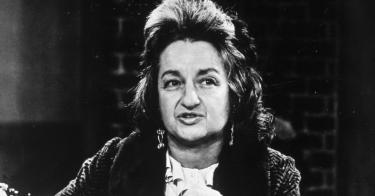In recent years, there’s been a lot of talk about elitism. Elites dominate higher education, Hollywood, Big Tech, and the media. They are the champions of critical race theory and identity politics, branches of the same poisonous Marxist tree. Such ideologies are based on group rather than individual rights and divide the world into oppressors and oppressed. But one of these ideologies has managed to cloak itself in a populist disguise: feminism.
American feminism at one time was a belief system based on democratic principles. First-wave feminists fought for equality before the law, property rights, and the vote. But second-wave feminist intellectual elites would hijack the term and the movement.
Second-wave feminism included two main components: employment reform and the sexual revolution. Some feminists cared about one over the other while others believed the two could not be divorced. But what did the women of middle America believe?
Betty Friedan is often credited with launching second-wave feminism in America with the publication of her book, “The Feminine Mystique.” She encouraged women to fulfill their purpose by entering the workforce. Her account of the lonely and bored 1950s and ’60s housewife was a national bestseller and sold over a million copies. In truth, its influence is unquantifiable, as her arguments (some of which were valid) transformed the workplace and seeped into the American consciousness.
>>> The Erasure of “Women” Is Escalating
As more feminists joined the movement Friedan launched, feminism became institutionalized. Friedan herself helped found the National Organization for Women in 1966. But tensions within the feminist movement soon arose in part because of arguments Kate Millett put forth in her radical book, “Sexual Politics.” Millett called for the destruction of the family and the sexualizing of children and taught that differences between men and women were a result of convention rather than nature. Those who adhered to her ideology also contended that women were oppressed merely by being heterosexual.
Feminists like Friedan lamented this shift: “The women’s movement was not about sex, but about equal opportunity. . . . It should not be the main issue, the tail that wags the dog.” It was certainly not the focus of “The Feminine Mystique” that had appealed to so many women.
Millett attempted to position herself as the successor to first-wave feminists, claiming they began the “sexual revolution.” Portraying herself as continuing a popular movement was a good rhetorical strategy, as it made her arguments seem less radical: “Nothing to see here, folks. I am just furthering the work of American women of the past.” Such an allegiance would have probably come as a shock to early feminists Lucretia Mott and Susan B. Anthony, both of whom were Quakers.
Though she appropriated the term (and their authority), Millett’s sexual politics is more properly understood as a break from, rather than a continuation of, first-wave feminism. First-wave feminists sought to align themselves with the classical liberal tradition, while second-wave feminists of Millett’s ilk were trustees of imported French and German Marxism.
When determining what about feminism resonated with American women, we would do better to look to Friedan over other second-wave feminists. In 1971, almost 65 percent of women had never heard of Gloria Steinem, Germaine Greer, or Kate Millett. The majority of American women in the 1970s “favored efforts to improve women’s status” but became unsympathetic to women’s liberation groups. They did not want to renounce their femininity or deny differences between men and women. It seems most American women were more interested in the feminism that promoted opportunities for women rather than sexual politics.
Despite radical sexual revolutionists’ disagreements with the principles of first-wave American feminists as well as average women of their own era, elite second-wave feminists became the gatekeepers of the feminist machine. Modern feminism is more the legacy of feminist intellectuals like Millett than the more popular Friedan.
As second-wave feminism continued and morphed into third-wave feminism, it gained power and prominence by aligning itself with advocates of identity politics. Today, arguments of feminists and identitarians are often indistinguishable. They view history as a struggle between oppressed women and patriarchal men and want retributive justice to make up for past wrongs.
Most American women today somewhat sympathize with feminism, but 39 percent also view it as polarizing. Does feminism deserve women’s loyalty, or has it become an elite ideology characterized by separatism and moral superiority? In truth, the sexual revolutionist arguments of Millett and others have harmed women, men, and families, particularly those in the working class.
>>> Economic Freedom Best Path to Women’s Equality, Empowerment
The affluent (including sexual revolutionists) attacked monogamy and the nuclear family in the 1960s. Those in the working class are now far less likely to get married and 10 times more likely to have children out of wedlock. Yet “young adults are at least ten percentage points less likely to be poor at age 25 if they were born to married parents.” The success sequence – getting a high-school degree, working, marrying, then having children, in that order – continues to be the ticket to financial flourishing. Elites still follow this sequence themselves but publicly dismiss its importance.
Although first-wave feminism helped rectify legal injustices, the victory of elite sexual revolutionists over other branches of feminism has harmed Middle America. American women can be grateful for the legal advances of the past without needing to extend their loyalty to feminism today. While first-wave feminists fought for the representation of all American women, modern feminism no longer represents us.
This piece originally appeared in Real Clear Public Affairs




